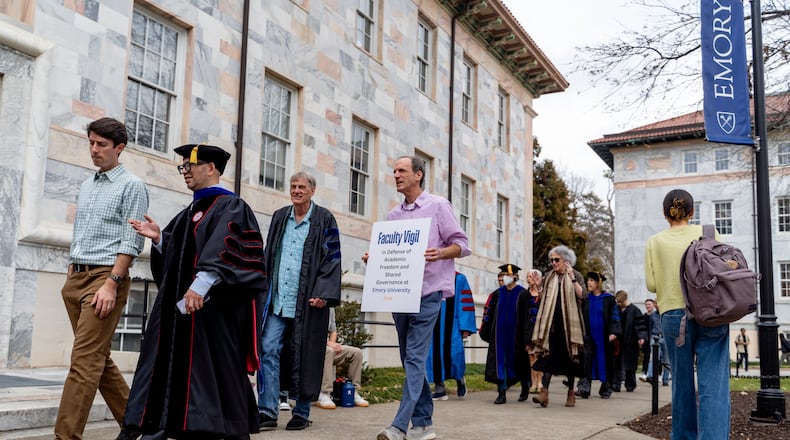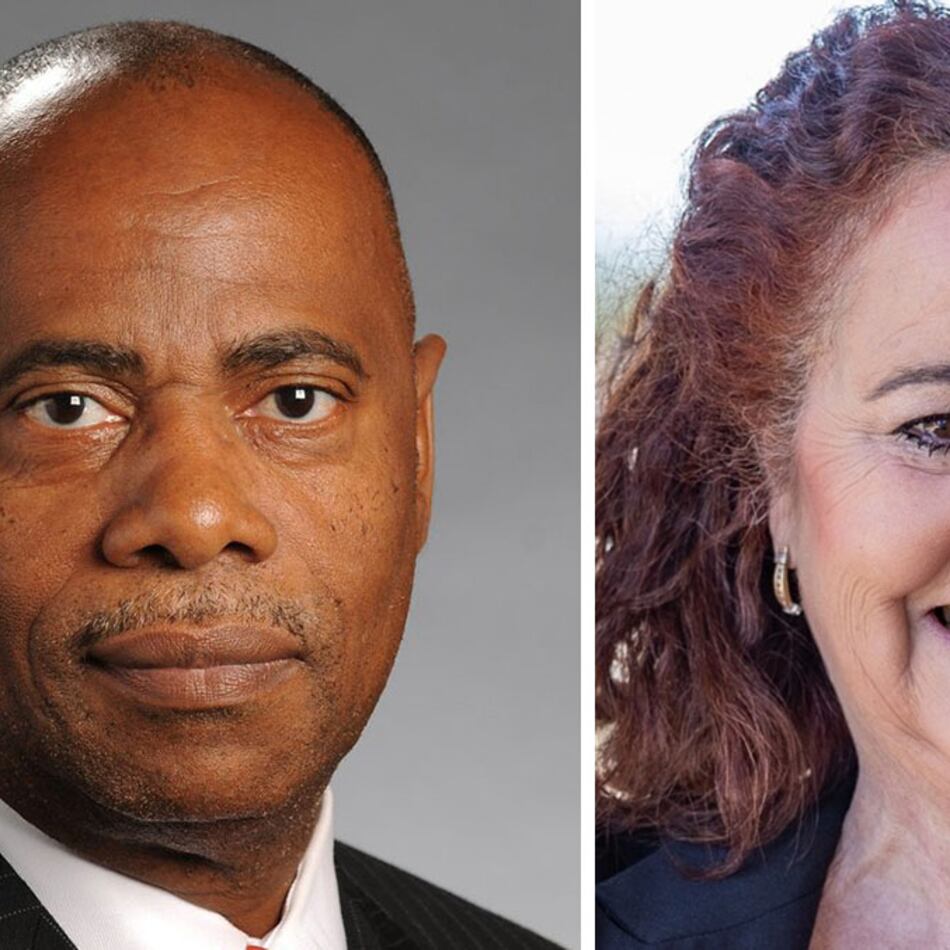Their demonstration in October did not produce the desired results. So about 20 Emory University professors, many donned in academic regalia, marched around the quad Wednesday afternoon in hopes that this time they might be heard.
They want President Gregory Fenves to call for charges to be dropped against students and faculty arrested during an April protest and they want answers to why administrators summoned police on campus in the first place.
But at the heart of their concern is “shared governance,” a concept where faculty, administration and other constituency groups work in concert to make important decisions about a university. Many faculty members at Georgia’s largest private university feel like their role is eroding.
Or, as longtime professor Clifton Crais believes, has already eroded.
“In many respects there is no shared governance. It’s a fiction,” Crais said.
Proponents say its erosion could damage education quality and limit academic freedom. They worry an unchecked administration could bypass faculty to decide what is taught at a university and who teaches it.
Emory responded to an inquiry about shared governance at the school, calls for charges to be dropped and allegations that the administration is making decisions without faculty input by sharing weblinks to prior university statements following the April protests and changes to one of its policies. It directed questions about the charges to the DeKalb County Solicitor-General’s office.
Credit: Ben Hendren
Credit: Ben Hendren
For years, faculty influence at Emory has been slipping according to professors who recently launched Faculty for Emory, a group of more than 60 faculty members who say the university has gone off course. They believe reforms are necessary to put it back on track, with a need to “reemphasize our academic mission and the faculty’s role in it.”
These concerns are not unique to Emory, said physics professor Ilya Nemenman, who chairs the University Senate Open Expression Committee.
Faculty at colleges nationwide want to retain responsibility over the academic mission and to influence broader university decisions. But Nemenman said at Emory — which has more than 4,700 faculty members — the problem has become so severe that some professors felt they had to do something about it.
“Faculty input has been diminished, and everybody is going to give you their own examples of it,” said Nemenman.
Some say the turning point was the administration summoning police to end a protest in 2023 against the Atlanta Public Safety Training Center. The move outraged some, as Emory’s open expression policy states that termination of a protest, “must be the option of last resort.” But Nemenman said administrators first spent hours negotiating with the protesters and then tried to reach him.
That was not the case last year, faculty members say. Crais said that on the morning of April 25, he messaged Fenves and other administrators, asking them not to call police and to work with faculty to diffuse the situation. He said he did not receive a response.
Nemenman said his requests for administrators to negotiate with the protesters, perhaps by asking them to move to a different location, were also ignored.
The answers to why administrators requested police may lie in an independent report the university commissioned days later. That review, conducted by Jones Day law firm, was to include how Emory engages external law enforcement. (Emory has its own police force.)
The school has declined requests from faculty to release even a redacted version of the report and told The Atlanta Journal-Constitution the review is confidential and subject to legal privilege from disclosure.
For professor emeritus Richard Doner, it is another example of the administration sweeping issues under the rug rather than working with faculty.
“It could be that Fenves did exactly the right thing. I’m willing to believe that, but just tell us what you know,” Doner said. “Good corporations learn lessons. We haven’t done that.”
Fenves further angered faculty Aug. 27 when they say he unilaterally amended the open expression policy, limiting the time, place and manner of protests without university senate input. Emory said the restrictions would keep the community safe and “codifies what has been a long-standing practice.” A senate review found his addendum lacked clarity and would likely cause confusion for protesters.
“Students want to know, ‘If I do this, are the cops coming?’” said Noelle McAfee, the senate’s president-elect. “Because they don’t want to go to jail. They want to go to medical school.”
That clarity could be coming soon. In a possibly positive sign for shared governance advocates, a senate committee is working with the president’s office to draft a new open expression policy.
Ultimately, the president would not have to follow it. His August addendum was a reminder that shared governance is a norm, not a legally binding contract.
“But these are norms that have made higher education in the United States one of the best systems in the world,” McAfee said.
McAfee has sensed a demoralized faculty since last spring. But she’s optimistic about the current policy draft.
While there are still areas of contention to work out, she said there is broad agreement between the senate committee and administration so far. If proposal becomes policy, might that alleviate the shared governance concerns that have long been building?
“It’ll be good for the moment,” McAfee said before chuckling. “Things can always turn the next day.”
About the Author
Keep Reading
The Latest
Featured



